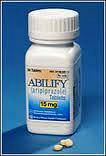Abilify medication is also known by the name of its generic version, aripiprazole.

This bipolar drug is generally regarded as having strong anti-manic properties so is most appropriate for treating manic episodes in bipolar disorder.
However, it can also be useful for treating major depression. Some of the evidence supporting the use of Abilify is very strong.
1
Please note though that other evidence in relation to Abilify for bipolar depression is contradictory or inconclusive.
Several double-blind, placebo-controlled studies have shown effectiveness for treating manic or mixed episodes in bipolar disorder.
There is also some research showing Abilify to be effective as a bipolar disorder maintenance therapy on its own
3, however there are inconsistent results when it has been studied in conjunction with a mood stabilizer (e.g. lithium).
It is in the treatment of bipolar depression where the evidence is weak and contradictory.
Note that Abilify is NOT FDA approved for treating bipolar depression. It’s main role as a bipolar medication is in treating manic symptoms, especially irritability and agitation.
What is Abilify?
You may be saying: “Yes, but WHAT IS ABILIFY?”
Abilify is a drug manufactured by US company Bristol-Myers Squibb.
It is what is known as a second generation antipsychotic.
A what?
An anti-psychotic is a tranquilizing medication which reduces psychotic symptoms and enables the patient to think and behave more rationally.
“Second generation” antipsychotics are also described as “atypical antipsychotics.” These are medications developed since the 1990s which have been shown to be more effective and have fewer side effects than traditional antipsychotics such as Thorazine.
“Abilify is attractive for patients who need a strong anti-manic, for example to control irritability. As with most bipolar medications, the side effects are many and varied so there are no guarantees. You won’t know if Abilify is for YOU until YOU try it.”
We still don’t know exactly how Abilify medication works. It is generally understood as having a stabilizing effect on important neurotransmitters in the brain, especially dopamine, and to a lesser extent, serotonin.
Abilify medication prescribing information
In the US, the FDA has approved the use of Abilify in treating:
- Oral:
- As monotherapy or as an adjunct to lithium or valproate for acute treatment of manic or mixed episodes associated with bipolar disorder
- Maintenance treatment of bipolar disorder
- Treatment of irritability associated with autistic disorder in children and adolescents.
- Adjunctive treatment of unipolar major depressive disorder in patients with an inadequate response to prior antidepressant therapy
- Treatment of schizophrenia
- Treatment of Tourette disorder in children and adolescents
- Injection (extended release):
- Maintenance monotherapy treatment of bipolar disorder.
- Treatment of schizophrenia.
SIDE EFFECTS: Include but not limited to:
Reminder
CAUTIONS: NOT to be used to treat older adult patients who have dementia.
- Speaking difficulties
- Loss of balance
- Uncontrolled movements
- Restlessness
- Trouble swallowing
- Trouble breathing
- Anxiety
- Headaches
and . . .
WEIGHT GAIN
The manufacturer provides some useful information on Abilify and its use in treating mania here.
2
One reason Abilify medication has gained traction as a bipolar treatment, especially in its earliest off-label days, was that it was thought to be weight neutral. However, now there is more evidence and it is not all encouraging:
Does Abilify Cause Weight Gain?
A Cochrane review has shown that Abilify still has significant metabolic side effects, however, less so than medicines like olanzapine and clozapine.
4
A better choice may be Latuda as it is not only less likely to lead to weight gain, but is actually a more effective treatment for bipolar disorder and is especially valuable in that it is FDA approved for the treatment of bipolar depression.
 Medically reviewed by
Medically reviewed by
One Comment
but abilify and latuda are for two different things. bipolar mania and bipolar depression. so how could that be a good alternative?